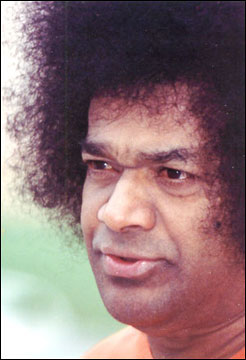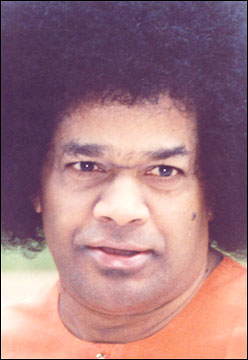Hislop (H): What does surrender to
the Lord mean in such common things as shaving, going to the market,
walking and so on?
SAI: Surrendering to
the Lord is surrendering all thoughts and actions, not wishing for
the fruits of the action, not doing action to gain its fruit but doing
the action because it is one's duty. The act is dedicated to the Lord
and the results, therefore, are borne by the Lord. Actions done thus
- fruits abandoned at the time of the action - such action is free
of karma. Since the ego, in this way, is not fed and cultivated, it
disappears before long.
For example, if one shaves, which is classed as an uninspired mundane
task, the attitude is that one is preparing for the sake of the Lord
in the heart, and one is making the best of his appearance to honour
the Lord, and not for one's personal vanity or reward. Also, in walking,
offer the action to the Lord to maintain a body fit for the Lord to
live in; and that is the attitude for every single act of the day.
Sweeping the house is dedicated to the Lord so that He may have a
fit dwelling. And cooking also is dedicated to Him so that the body
may be strong and vigorous for the benefit of the Lord.
It is folly to seek the fruit of action. When one dies, the only items
taken with one are one's good and bad deeds. None of the power, the money, the position, the prestige, the vigorous beauty of the body,
the culture of the personality - these things are all gone, and therefore
what folly to work for them. Man is life with desire; life without
desire is God. Mind is desire; when mind disappears, desire disappears.
money, the position, the prestige, the vigorous beauty of the body,
the culture of the personality - these things are all gone, and therefore
what folly to work for them. Man is life with desire; life without
desire is God. Mind is desire; when mind disappears, desire disappears.
H: Swami, a taxi will arrive here for us on the afternoon
of the 26th for our departure.
SAI: No, no - that is
wrong. When you came from so far to see Sai and then take a taxi for
Bangalore, Sai is shamed. It should be left for Sai to take care.
You should not do it yourselves.
H: I will at once cancel the taxi.
SAI: In the last day
or so there have been riots in Bangalore by students protesting against
the campaign by northern politicians to have Hindi as the national
language instead of English. There were bomb blasts and other violence.
It might be better for you and your wife to leave here on the 25th
instead of the 26th. A high northern official will be arriving, and
probably there will be more rioting.
H: What is meant when Swami says to a departing devotee
that 'Swami will be with you wherever you are; Swami is in your heart'.
SAI: The situation can
be compared to a man and a stick floating in the ocean. Both have
the same motion, up and down with the waves; but the stick does not
know what is happening, whereas the man is conscious of the movement.
The movement of the stick could be compared to a person in America
in whose heart God resides but who has never been here to visit Swami.
The conscious movement of a man swimming in the ocean could be compared
to an American who has visited here and then returned home; now there
would be conscious spiritual experience and that would be the case
whether we consciously invited that experience or not.
There are three stages to knowing God. One is intellect, which is
just imagination; one is drawing near; and third is union with God.
Another example: the river merges with the ocean, but if one takes
sweet water from the river and places it in a sealed plastic bag and
places that sealed bag in the ocean, there is no mixing of that water
with the ocean. Such a condition could be compared to one's state
before coming here; but after coming here it is as though the sweet
water were not held separate from the ocean but were merged and mixed
with the ocean. The mixing stage is here. Swami is the servant of
all, and as servant He enjoys much better than as Master.
H: What is the meaning
of the word, Dharma?
SAI: The word Dharma
does not mean 'duty'. In duty there is no freedom; in reason there
is freedom; and in religious obligation there is the union between
duty and reason. Dharma, then, refers to religious obligation and
in that word are the concepts of both duty and reason.
Visitor: There is a difficulty that arises in giving honour to two
different aspects of the Lord. For example, Mother in Sri Aurobindo's
ashram, and Swamiji here.
Visitor: There is a difficulty that
arises in giving honour to two different aspects of the Lord. For
example, Mother in Sri Aurobindo's ashram, and Swamiji here.
 SAI:
There are two ways; one in which the Divine in seen everywhere and
there is then no conflict whatsoever; and the other way in which one
feels strong devotion to one single person and is happy in that devotion.
In the latter case, one should hold strictly to that Guru and have
nothing to do with other Gurus. When one works at a task one needs
to give that task full attention and concentration and cannot be thinking
of the Lord while doing that task. But the principle involved is the
attitude of dedicating everything to the Lord and not doing work because
of the fruit to be gained from that work but, on the contrary, doing
the work because it is one's duty to do it very well.
SAI:
There are two ways; one in which the Divine in seen everywhere and
there is then no conflict whatsoever; and the other way in which one
feels strong devotion to one single person and is happy in that devotion.
In the latter case, one should hold strictly to that Guru and have
nothing to do with other Gurus. When one works at a task one needs
to give that task full attention and concentration and cannot be thinking
of the Lord while doing that task. But the principle involved is the
attitude of dedicating everything to the Lord and not doing work because
of the fruit to be gained from that work but, on the contrary, doing
the work because it is one's duty to do it very well.
Visitor: Can I wear shorts while here at the ashram?
SAI: No. That is not
allowed. In spiritual life, the fastest progress is made when the
boat sails with the wind, and if the boat has to sail against the
wind, progress is slower.
Visitor: Well, Swami, the trouble is to determine
which way the wind is blowing.
SAI: That is really
very simple. With practice, a driver of a car learns to be so skilful
at driving that either a wide boulevard or a narrow road makes no
difference to him - he drives on both with equal confidence. In the
same way, a Guru is necessary in order to learn how to take advantage
of the wind in the sea of the spirit.
The trouble is that nowadays it is very difficult to find a Guru.
As soon as a person puts on a yellow robe he considers himself a Guru
and wants to teach people. The best way to determine whether or not
a Guru is genuine is if his words are full of wisdom and if in his
life what he practises is the same as his words. If the Guru speaks
only words of wisdom, and this is an age where people speak wisdom
without being wise, the words of wisdom will produce no result whatsoever
and are useless.
The best Guru today is God. In the spiritual world, the Guru is a
doctor who takes the temperature of the aspirant - from the temperature
he is able to gauge his condition and what is best for him. But if
the Guru himself has temperature, then the temperature of the aspirant
would be distorted by the temperature of the Guru. So the best Guru
today is God.
(To be continued…….)




 money, the position, the prestige, the vigorous beauty of the body,
the culture of the personality - these things are all gone, and therefore
what folly to work for them. Man is life with desire; life without
desire is God. Mind is desire; when mind disappears, desire disappears.
money, the position, the prestige, the vigorous beauty of the body,
the culture of the personality - these things are all gone, and therefore
what folly to work for them. Man is life with desire; life without
desire is God. Mind is desire; when mind disappears, desire disappears. SAI:
There are two ways; one in which the Divine in seen everywhere and
there is then no conflict whatsoever; and the other way in which one
feels strong devotion to one single person and is happy in that devotion.
In the latter case, one should hold strictly to that Guru and have
nothing to do with other Gurus. When one works at a task one needs
to give that task full attention and concentration and cannot be thinking
of the Lord while doing that task. But the principle involved is the
attitude of dedicating everything to the Lord and not doing work because
of the fruit to be gained from that work but, on the contrary, doing
the work because it is one's duty to do it very well.
SAI:
There are two ways; one in which the Divine in seen everywhere and
there is then no conflict whatsoever; and the other way in which one
feels strong devotion to one single person and is happy in that devotion.
In the latter case, one should hold strictly to that Guru and have
nothing to do with other Gurus. When one works at a task one needs
to give that task full attention and concentration and cannot be thinking
of the Lord while doing that task. But the principle involved is the
attitude of dedicating everything to the Lord and not doing work because
of the fruit to be gained from that work but, on the contrary, doing
the work because it is one's duty to do it very well.